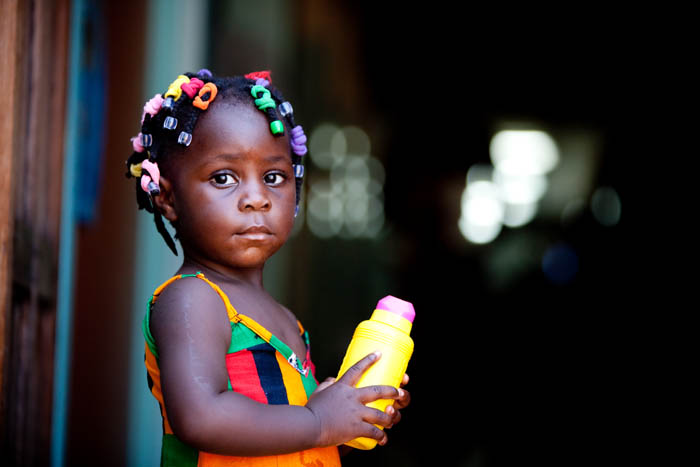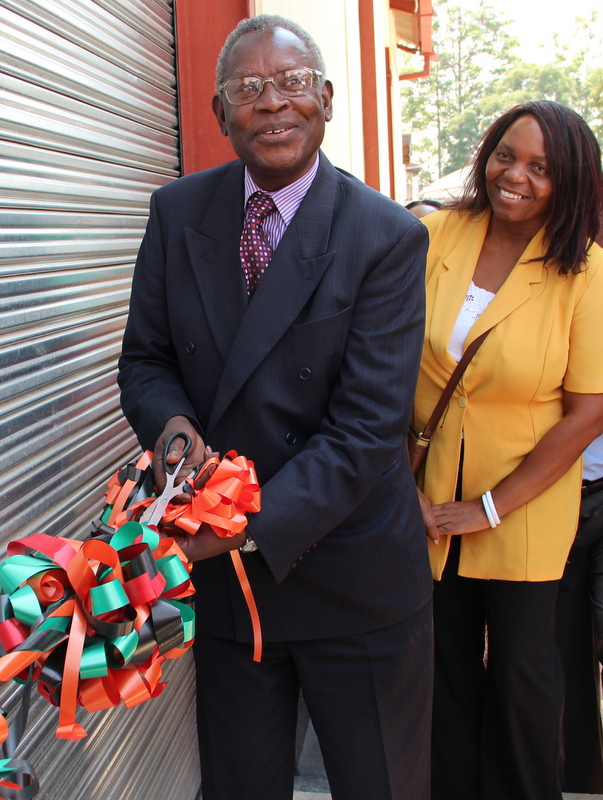Zambia National Rotavirus Vaccine Rollout: New collaborative approaches to accelerating vaccine introduction into resource-poor countries—the case of rota introduction in Zambia
|

While Zambia launched the rotavirus vaccine nationally today, the vaccine has been in public health clinics across Lusaka Province—the most populated province and home of the nation's capital—for over a year and a half. The Government was keen to introduce three new vaccines into the national immunisation programme, but it needed to meet the conditions for GAVI Alliance support based on their 2011 request for introduction. In the government's plan, rotavirus vaccine was third in line behind pneumococcal and the second dose of measles. Hence, Zambia embarked on an innovative approach to accelerate the introduction of rotavirus and new vaccines into the country, and to embark on a collaborative, comprehensive approach to combat diarrhoeal disease.
Dr. Joseph Katema, Minister of Community Development, Mother and Child Health, giving the vaccine against rotavirus to the first child in Zambia.
Annually, there are an estimated 10.5 million cases of diarrhoea, and 63,000 hospitalisations and 15,000 deaths attributed to the disease in children under-5 in Zambia. A myriad of factors contribute to Zambia's third largest killer of under-5 children, including poor public awareness of appropriate life-saving measures, a high nurse and doctor-to-population ratio, limited vaccine cold chain capacity, erratic access to essential medicines and competing priorities for investments in health.
This was the impetus for the initiative known as the Programme for the Awareness and Elimination of Diarrhoea (PAED), a collaborative effort initiated by the Centre for Infectious Disease Research in Zambia (CIDRZ), Absolute Return for Kids (ARK) and Comic Relief, working in partnership with the Zambian Ministry of Health (MoH) and the Ministry of Community Development, Mother and Child Health. PAED works together with key stakeholders to jump-start and build momentum to control diarrhoea and create awareness of this critically neglected disease. PAED is a pilot whose aims are to reduce under-5 mortality in Lusaka Province through the introduction of a comprehensive diarrhoea control programme that includes rotavirus vaccination, improved clinical care for diarrhoea and dehydration, and community mobilisation and action, as well as to accelerate the country-wide introduction of rotavirus vaccination and other high-priority childhood vaccines into the country.

Honourable Minister of Health Kasonde opens the cold chain warehouse in Lusaka.
This initiative works hand-in-hand with Government, ensuring they are not just aware of PAED activities, but actively involved in the development and guidance of the project. This approach involves greater coordination amongst all partners working within the child health and diarrhoeal disease space, and includes policy-makers, donors and all organisations working within the national immunisation programme, public health clinics and in commodities management, as well as working with community groups supported by Government and at the grass-root level. PAED's model involves a concerted effort to:
· Coordinate amongst all relevant stakeholders;
· Have complete integration within Government child health activities, ensuring integration of projects into existing programmes;
· Advocate at national and international levels;
· Network amongst other multilateral, bilateral and non-profits for awareness and additional support (technically and monetarily); and finally
· Mobilise resources, with a focus on leveraging off of other initiatives to lessen the burden of support on one organisation.
PAED was successfully integrated into the health system and officially launched by the Minister of Community Development, Mother and Child Health in January 2012. Preparatory work prior to that launch included: introduction and acceptance of PAED in the Inter-agency Coordinating Committee (ICC); development of Zambia's proposal for introduction of new vaccines to GAVI Alliance; addressing GAVI Alliance conditions, including conducting the World Health Organisation's tool and training to assess vaccine management in the country (called Effective Vaccine Management), this led to the development of a national cold chain scale-up strategy and included a plan to mobilise resources; development of vaccine orientation materials and adaptation of routine health information tools; lobbying for a vaccine donation from GlaxoSmithKline Biologicals; conducting health worker training and health facility preparations; and finally the launch and step-wise Lusaka Province-wide roll out of the rotavirus vaccine.
The PAED approach has directly and indirectly assisted to leverage over $14 million USD (including the seed funding of $5.6 million) to combat diarrhoeal disease through the support for the immunisation programme and the vaccine cold chain, to conduct research, to address stop-gaps in the supply chain for essential medicines and to extensively evaluate the impact of this programme in order to provide evidence for policy and decision-making in the future.
Through the pilot approach—before national introduction—PAED was able gain insight on practices and barriers to vaccine uptake and diarrhoea prevention and treatment in clinics and communities. PAED gained feedback on difficult areas of vaccine delivery, clinical management and community uptake, and tried to address and strengthen these issues, as well as to look into behavioural implications in communities. All of this insight and information directly feeds-back to the Government to assist in national rollout of vaccines and service delivery for child health interventions within the Ministries technical working groups, which address implementation at every level within the country.
Another important aspect to the PAED pilot is the unique funding partnership. ARK and Comic Relief go beyond typical donors support, who often operate within more rigid terms or funding mechanisms. ARK and Comic Relief are keen to respond to the ever-changing and dynamic environment of public health systems in resource-poor countries. Between new policies and governments, fluctuating donor activities and realising that some information is only found out when you really start implementing, ARK and Comic Relief have provided flexibility to this dynamic environment. This ability to change and adjust based on an evolving situation should be a recommended model for other donors, as it creates strong partnerships.
To date, PAED has fully-immunised over 100,000 children against rotavirus. The pilot has also trained almost 500 community workers on diarrhoea prevention and treatment, and trained over 500 public health workers and strengthened Oral Rehydration Therapy corners in every public health clinic in the province.
As PAED moves forward in its final year of implementation it hopes to be a model of which not only Zambia can learn from, but other countries as well. Dissemination of lessons learnt and sharing PAED's evaluation results, including vaccine efficacy, cost-effectiveness and overall impact on under-five mortality is equally important. This information will not only assist policy and decision-makers in Zambia, but within the region as we look for better ways to coordinate, impact and reduce child mortality. PAED also serves as a model platform for how to operationalise new initiatives such as GAPPD—the Global Action Plan for the Prevention of Pneumonia and Diarrhoea.
We are excited for Zambia's national rollout of the rotavirus vaccine and its impact on child mortality, but equally we are excited on how we can learn from this model to have even more impact in the future.
For more information:
-- VIDEO: Zambia's integrated approach to diarrhea serves as a model for other countries.
-- PHOTOS: In Mazabuka, Zambia, students become teachers about safe drinking water, sanitation, and hygiene.
-- PHOTOS: In Mukuyu Village, parents share what they have learned from their community health workers about how to care for their children.
Photo credits: CIDRZ














